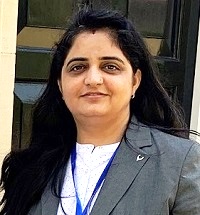4611
Scientific Program

Deepika Chauhan
Jawaharlal Nehru University. India
Biography:
Deepika Chauhan is currently pursuing Ph.D from Special Centre for Nanoscience, Jawaharlal Nehru University New Delhi-India. Deepika Chauhan has completed her Master in chemistry from Panjab University Chandigarh in 2010. She is currently working on synthesis and modification of different nanomaterials for biomedical applications including biosensor, bioimaging and drug delivery. She has developed different biosensing platforms for detection of Vitamin-d3. In this regard she has published three research papers in reputed journals and filed one patent.
Abstract
Vitamin-D (Vit-D) deficiency is a worldwide health problem and the conventional techniques available for monitoring its status are expensive, time consuming and required centralized labs. The biosensor are good alternative over these techniques and in the present study we have fabricated nanostructured ceria (nCeO2) based bioelectrode for detection of 25-Hydroxy Vitamin-D3 (25-OHVD3). For bioelectrode fabrication, carbon cloth (CC) taken as a substrate as it is highly conductive, flexible, economical, easily available and eco-friendly material that can replace other substrates such as conductive glass substrate (ITO & FTO) and glassy carbon electrode etc. nCeO2 were synthesized using hydrothermal route and characterized through X-ray diffraction (XRD), Fourier transform infrared (FTIR) spectroscopic, transmission electron microscopy (TEM), Raman spectroscopy and Zeta potential measurements. The average size of nCeO2 was found to be 18.19±2.96 nm and the surface charge obtained by zeta potential measurement was -2.4 mV. The anchoring of nCeO2 onto CC was done by electrophoretic deposition method and we get a uniform and tightly deposited nCeO2/CC electrode. nCeO2/CC electrode was modified with biomolecules (anti-25VD3 and BSA) to fabricated the bioelectrode (BSA/anti-25VD3/nCeO2/CC) for detection of 25-OHVD3. The fabricated bioelectrode were characterised through scanning electron microscopy (SEM) atomic force microscopy (AFM) techniques. Further, the response study of bioelectrode as a function of 25-OHVD3 concentration revealed a linear detection range of 1-160 ng mL-1 with sensitivity of 2.08 µA ng-1 mL cm2, detection limit of 4.63 ng mL-1 and response time of 15 minutes. The validation study conducted on BSA/anti-25VD3/nCeO2/CC bioelectrode was in good agreement with the results obtained from ELISA of serum samples collected from healthy persons.
- Applications of Microfluidics & Lab-on-a-Chip
- Droplet-based, Digital, Centrifugal Microfluidics
- Point-of-Care & Biosensors
- Wearables & Mobile Diagnostics
- Micro-chemistry and Micro-systems
- Nano-channel, Micro-channel and Mini-channel
- Bio-fabrication & Bio-manufacturing
- Optofluidics, Plasmonic and Bioimaging Devices
- Acoustic Droplet Ejection
- Tissues-on-a-Chips and 3D Cell Culture Systems
- Drug Discovery in Microfluidics
- Microfluidics Simulation

